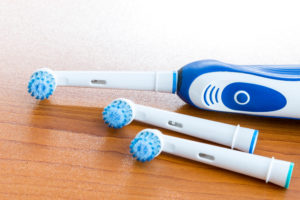
You see, it’s not that we don’t want to help you out by making sure you have a new toothbrush, it’s just that we think maybe you should switch to another type of toothbrush, an electric toothbrush.
We’re not trying to push some luxury product on our patients — electric toothbrushes do a better job. Want a second opinion on that? The American Dental Association just approved five Oral-B Oscillating-Rotating-Pulsating Power Toothbrushes in September 2017, giving them the ADA Seal.
Now, we can’t really go and give every patient an electric toothbrush. But we think our patients should take a close look at them.
Why is an electric toothbrush better?
As you would expect, electric toothbrushes do the work for you. You place the brush head on your teeth and gums and let it rotate and pulsate and get rid of all the plaque it comes in contact with. Most of these toothbrushes have a built-in timer that tells you when you’ve been brushing for two minutes, the length of time recommended by the American Dental Association. Basically, all you need do is move the head from tooth to tooth and it will remove the plaque from your teeth.
The goal is to be a thorough brusher, and many people are any but that. Because the heads rotate or otherwise move, the odds of doing a better job than your hand and arm are heavily weighted in favor of electric toothbrushes. If you’re a very diligent brusher, you may get every tooth brushed and hit your gums. But not many people ever brush for the full two minutes recommended. The problem with some even good manual brushers is they can be too aggressive. This can lead to gum recession.
Here are some specific cases where electric toothbrushes are a no-brainer.
- If you’re a lackadaisical brusher— You know who you are. You brush your teeth but are far from thorough. You could easily leave a tooth here or there with plaque on it.
- If you’re a kid— Little kids love electric toothbrushes because they’re fun gadgets. Some think they tickle their teeth. Once you explain to place the brush head on each tooth, they’ll do a good job brushing. Also, kids with traditional braces benefit mightily from electric brushes because of their thoroughness.
- If you’re elderly— As we age, many of us have some dexterity issues with our hands and fingers. Electric brushes don’t require any hand or finger dexterity.
Statistics?
You want numbers? Try these. Your hand and arm can produce around 200 strokes per minute with your manual toothbrush. An electric toothbrush generates 30,000 strokes per minute. Which do you think will clean better?
Want research proof? Oral-B, which makes both electric and manual toothbrushes, had dentists and hygienists ask 16,000 patients to use an Oral-B electric toothbrush between six-month regular cleanings/exams. When asked to monitor how their patients’ teeth looked afterwards, the dental professionals said the electric toothbrush had a positive effect on the oral health of over 80 percent of the patients.
You should look into an ADA-approved Oral-B Power Toothbrush. If you have any questions, or to make your next appointment for your professional cleaning and exam, call us at Gentle Dental, (732) 549-5660.



